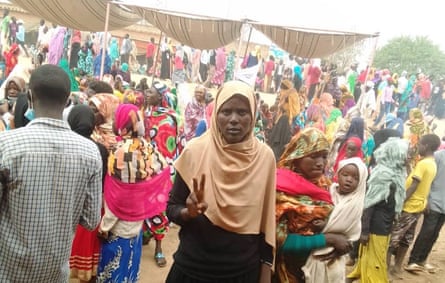Thousands of people have joined a sit-down protest in front of local authority buildings in Central Darfur demanding action against the armed groups that patrol the region.
A large number of women have joined the first peaceful demonstration – now in its second week – in Nertiti county since war erupted in 2003.
Some of the women, with children on their backs, carry food on their heads to feed the protesters, who want the military governor removed from office and replaced by a civilian. They also want to see an end to attacks on civilians, the prosecution of perpetrators of violence and access to land taken from them by armed settlers, backed by the government of Omar al-Bashir.
In the past four weeks, the Darfur Bar Association said it had registered 48 cases of violence against civilians in Nertiti and surrounding areas.
A delegation from the government in Khartoum visited the protest camp and has promised to address the issues.
But protesters say they will not leave until the government acts on all their demands. “We will stay here even for a year if what we are looking for is not actually met,” said Abudlmukaram Adam, a protester and lawyer from Nertiti.
Darfur has been ruled by emergency orders from Khartoum since 2003 when black African groups launched an insurgency over oppression by the Arab-dominated government. Janjaweed militias, backed by the government, have been accused of mass killings and rapes in response to the insurgency. The UN said more than 350,000 people have been killed and at least 2 million displaced by conflict in the region.
The sit-in began at the end of June and has grown steadily as more people join from other states in Darfur.
Protesters are camped in front of the county’s government headquarters, mobile clinics have been set up and local people donate food. It is strikingly similar to the protests at the military headquarters in Khartoum last year. On that occasion more than 100 people died when security forces dispersed the crowd.

Protester Mohamed Hafiz, 58, who now works as a driver, said he’s longing to have his land returned. “Armed people took my land in 2005 and I would love to take it back from them and farm it this year.” The father of six complained that the lack of security in the area made his current job difficult. “You cannot drive more than a few kilometres without being attacked by armed militias. Since Bashir’s fall, nothing has changed in Darfur. The change is only in Khartoum.”
Another protester, Um El-Nass Dawood, 25, who grew up in an internally displaced persons camp near Nerititi, told the Guardian she wanted fair representation of Darfuri women at the highest levels of government. “We want to see women like us represented at all levels of governance because they understand our issues,” said the law school graduate.
There are four women ministers in the current administration but all of them, along with the majority of government officials, come from the same ethnic groups that have been running the country since independence in 1956.
